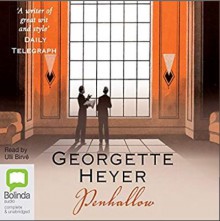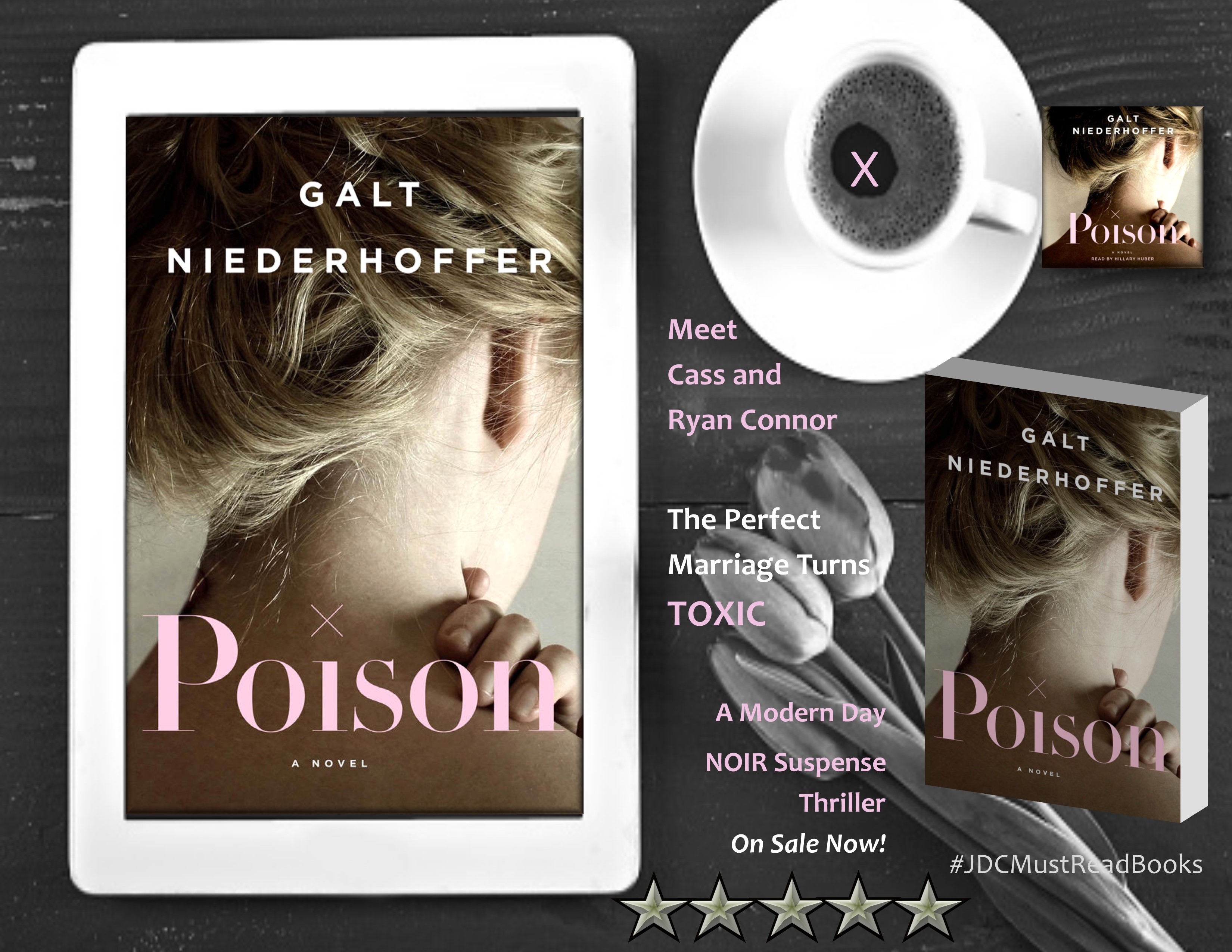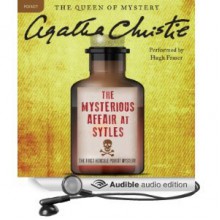... in the order in which they're appearing on my card (not the order in which they've read them).
Soooo ... in this year's twist on RL doing its best trying to throw a spanner in the works of Halloween Bingo fun, I've been spending the better part of the month either sitting around in conference rooms or glued to some piece of writing on my computer screen (or both). Fortunately this has so far involved a fair amount of driving, too, so I've largely been able to shift my bingo reads to audiobooks ... without, however, also having a whole lot of time to write reviews. Looks like right now is one of those moments where I might have a shot at catching up -- so let's give this a try, shall we?
In other words: Halloween Bingo 2018: the (mostly) audiobook version.


Georgette Heyer: Penhallow![]()
On the face of it, your classic country house mystery, country estate and horse farm in Cornwall and all; but Heyer wrote this as a contract breaker, and boy, does it ever show. Neither seekers after romance and after knights in shiny armour nor seekers of a genteel country house atmosphere need apply here, and what might be termed "a somewhat crotchety original" in any other book (including but not limited to Heyer's own), here is styled as a crass, meanspirited old family tyrant who likes nothing better than bullying each and every member of his vast and long-suffering family into submission and downright terror. With the exception of two creations by Agatha Christie (Simeon Lee in Hercule Poirot's Christmas and Mrs. Boynton in Appointment with Death), I can't think of any character in another mystery, Golden Age or not, who is so totally devoid of redeeming qualities. However, while both of Christie's two infamous bullies -- who clearly come from he same mold as old Penhallow -- meet their ends fairly early on in the respective books and thus relieve both the reader and their families of their continued presence, we (and Penhallow's harrassed household) have to suffer until almost the 65% mark of this book until someone's nerves finally snap once and for all. We actually get to witness the murder, so there's no great mystery as to whodunnit -- although I admit that for the longest time I kept hoping for a Christie-esque twist, but that was not to be.
(Also, though this is a far cry from George R.R. Martin, be careful which of the other characters you invest your sympathies in ... though God knows, few enough of them deserve any empathy to begin with; but then, with old man Penhallow around, it's hard to see how any of them could have grown both a spine and halfway decent manners at all.)
There's some ambivalence as to the book's two LGBT characters -- one son of Penhallow's who is obviously modeled on Oscar Wilde and who, apart from a few witticisms, comes across rather negatively and as checking off pretty much every anti-gay cliché in the book, and a daughter who, apart from being a bit "bossy", is one of the few members of the younger generation endowed with a brain, a healthy dose of common sense, and the gumption to stand up to her father (albeit helped, no doubt, by the fact that she is also one of the few family members not financially dependent on the old man).
All in all, a far cry from your typical Heyer (or at least, from her mysteries -- can't speak to her Regency romances) -- I'm not sorry I read it, but as far as grumpy old patriarchs and bickering families go, I vastly prefer one of her Inspector Hemingway mysteries, Envious Casca (republished as A Christsmas Party).


Patricia McKillip: The Forgotten Beasts of Eld![]()
My first book by McKillip; a short(ish) fantasy tale substantially in the traditional mold with a strong female heroine -- a sorceress living on a mountainside high above the fighting human empires down in the plain; alone but for the company of a number of magical beasts. At the risk of sounding jaded, the basic plotline (and the type of ending) is pretty much telegraphed from the very beginning; still, the characters are emphatically drawn, there are enough twists and turns over the course of the story to always ensure that the book held my attention, and I'm definitely interested in reading more books by McKillip in the future.


Mary Roberts Rinehart: Locked Doors![]()
The second of Rinehart's "Nurse Hilda Adams" stories; in terms of setup, of the "woman in peril" kind of tale that Rinehart specialized in -- and which I'm usually not a fan of, but I'll gladly make an exception here. Nurse Hilda is the epitome of what is called a "feisty" young woman in certain types of fiction: especially taking into account that this story was written shortly after the turn of the last century (published in 1914), she is independent (and independently-minded) and able to take care of herself to an extraordinary degree, and thus makes for an admirable protagonist. Here she takes a position in a stately home where, as she soon finds out, bedroom doors are locked at night, beloved pets go missing, all the servants have recently left or been let go, and there seems to be a strange, slithering presence on the stairway at night and a mystery madwoman (or invalid) in, you guessed it, the attic -- but before you cry "Gothic cliché", beware ... just like Nurse Hilda, Rinehart actually had her feet planted firmly on the ground, and was also very much up to date with the state of medical knowledge and research, which in an unexpected way made this story an enjoyable companion read / listen to Jennifer Wright's decidedly less enjoyable Get Well Soon. I guess at some point I should also read Rinehart's Circular Staircase, which I'm still not entirely sold on however, but I'll definitely read more of her Nurse Hilda stories.


Joy Ellis: Their Lost Daughters![]()
Why, oh why did anybody think that this book's title (!!) needed an appendage such as "a gripping crime thriller with a huge twist" on Amazon (and likely thus also on every other site that draws its feed from Amazon and where there aren't any librarians to do away with this sort of nonsense) in order to generate proper sales?! That sort of hype is, ordinarily, a sure fire turn-off for me, and it almost would have been here, too, had Their Lost Daughters not been reviewed favorably by friends whose opinions I trust (and, cough, I admit the fact that the audio version is narrated by Richard Armitage helped as well). As a result, I'd almost have missed out on one of the best books I read all year ... and that makes me even madder at whoever was the eejit that came up with that super-hypey tag line.
Beyond the fact that this begins as a "missing girls" investigation, there is little I can say in terms of plot description that wouldn't be a huge spoiler, so let's just stick with the fact that Ellis draws the sombre, downright oppressing Fenlands setting very, very astutely and expressively, and her team of detectives (led by DI Rowan Jackman and DS Marie Evans) are among the most likeable, rounded, and overall believable investigators that have appeared on the mystery scene in recent years -- and I also very much like Marie's (Welsh) mother, who I hope is going to be a continued presence in the series, too. That all said, and much as it pains me to admit it, the "huge twist" thing from Amazon's abominable tagline is actually true: even if you think you sort of see part of the solution coming, you don't clue into how it all hangs together until it's unraveled right under your very nose. (And lest anyone say the solution is too outlandish to be true, there are several real life cases published in the past couple of years that featured decidedly more gruesome facts, and which may easily have inspired this book's solution; or at least, certain parts of it.)


Angela Carter: The Bloody Chamber![]()


Anthony Berkeley: The Wychford Poisoning Case![]()
The fifth time, this year alone, that I've found myself running into a fictional incarnation of the (in)famous real life case of Florence Maybrick, the American-born Liverpool housewife convicted, in 1889, of having murdered her husband by administering to him a dose of arsenic obtained by soaking flypaper in water -- allegedly in aid of concocting a beauty cream. Mrs. Maybrick's method, if indeed this was how her husband found his premature end, may have engendered several real-life copycats (including, most famously, just after the turn of the 20th century, Frederick Seddon and Herbert Rowse Armstrong ... if the medical evidence given at their respective trials is to be believed, that is), and British mystery writers have downright flocked to her footsteps ever since in fiction as well. Agatha Christie used a variation of the Maybrick case as a basis for Crooked House; Anthony Rolls based Family Matters on pretty much every salient detail of the Maybrick story except for the flypaper bit; which in turn, however, makes a starring appearance in P.D. James's short story Great Aunt Ally's Flypaper (later republished as The Boxdale Inheritance), which features a very young Sergeant (Inspector-to-be) Dalgliesh and is included in my very first read of this year, the P.D. James short story collection The Mistletoe Murder (as the title indicates, a "holdover" from my 2017 Christmas reads), as well as in the Detection Club anthology Verdict of 13, which I read for this year's Halloween Bingo (see mini-review below). Finally, also in that latter anthology, Christianna Brand has the real-life Mrs. Maybrick meet two other alleged, famous 19th century women poisoners in a story aptly entitled Cloud Nine.
No wonder, then, that Anthony Berkeley, like his fellow Detection Club members acutely aware of the criminal causes celèbres of his own and of bygone eras, would also seek inspiration in Mrs. Maybrick's legacy. Martin Edwards makes the case, in The Golden Age of Murder, that Berkeley's books offer clues -- perhaps more so than the books of his fellow Golden Age mystery novelists -- to his own personality, experience, and outlook on life. I haven't read enough books by Berkeley yet to make up my mind how much I think there is to this theory, but if The Wychford Poisoning Case is any indication indeed, Mr. Berkeley (despite his reportedly boisterous persona) was, deep down, a very reticent and private man ... and supremely uncomfortable around women, who are either "high" or "low", either vamp, stupid chicken, naughty girl, mother, MissMarpleSilverBradleyVane incarnate, or grand dame, and only in the last-mentioned cases accorded a halfway rounded, three-dimensional, individual personality (with some allowances made in favor of girls from a decent background, who have the makings of turning either into true ladies / grand dames, or into women detectives or fiction writers, or even into all of the above, later in life). There are passages in this book that are redolent with blatant mysogyny, and yet, I hesitate to append this label wholesale ... more than anything, it seems to me that Berkeley very much wanted to, but simply didn't "get" women and, consequently finding himself rejected and dissatisfied (none of his several marriages were happy), resorted to the stereotype prevalent in his era anyway; essentially, the "sinner or saint" dychotomy.
That all being said, the mystery itself is cleverly constructed, and notably this is not the only book where Berkeley's series detective, Roger Sheringham, comes into the case on the side of the accused woman and with the express intention to exonerate her from what he considers a rash and unjustified charge. And while the true facts of the Maybrick case will almost certainly never be unraveled, it is just conceivable that Berkeley did, in fact, hit on the one solution that was closest to the historic truth.


Jennifer Wright: Get Well Soon![]()
Reviewed separately HERE. Also a Flat Book Society read.


The Detection Club: Verdict of 13![]()
An anthology published by the 1970s' incarnation of the Detection Club, edited by its then-president Julian Symons, featuring 13 short stories all premised, in a very loose sense, on the concept of a jury (even if it's only a jury of one). Contributors include -- in addition to Symons -- P.D. James and Christianna Brand (see comments above, re: The Wychford Poisoning Case / Florence Maybrick), Gwendoline Butler, Dick Francis, Michael Gilbert, Michael Innes, Patricia Highsmith, Celia Fremlin, H.R.F. Keating, Michael Underwood, Ngaio Marsh, and Peter Dickinson.
The stand-out stories, to me, are P.D. James's Florence Maybrick-inspired look at an early moment in Inspector (then-Sergeant) Dalgliesh's career (see comments above) and Michael Gilbert's Verdict of Three, a cleverly constructed public-school-morphing-into-public-service combined update of Arthur Conan Doyle's Adventure of the Second Stain, The Naval Treaty, and The Bruce-Partington Plans, told from the perspective of the person who, in a Sherlock Holmes story, would be Holmes's client (except that Holmes, here, has contrived to be part of the jury). "Place" and "show" honors go jointly and equally to Ngaio Marsh's Morpork (which I'd also read before, but long ago; a story set in the wilds of her native New Zealand); as well as Dick Francis's Twenty-One Good Men and True (involving race track betting), Gwendoline Butler's The Rogue's Twist (in which dogs are, depending how you look at it, either part of the jury or part of the prosecution), and Michael Underwood's Murder at St. Oswald's (as the title indicates, another story set in a public school; here, involving a bullying teacher).
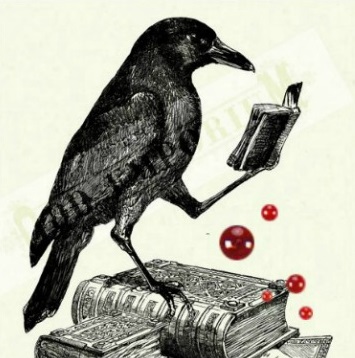

Mavis Doriel Hay: Murder Underground![]()
Hay's first of the only three mysteries she ever wrote, but the last one I read. Of the three, I'd rate it the middle entry -- it's not anywhere near as enjoyable as The Santa Klaus Murder (Hay's final book and one of the highlights of my 2017 Christmas reads), but I liked it quite a bit better than Death on the Cherwell. Oddly, the titular murder is completely taken as a fait accompli here: we're not even in on the discovery of the body, never mind meeting the victim-to-be in the flesh and seeing her interact with the suspects-to-be (all of them, residents of the same North London longterm-accommodation hotel as herself; two, in addition, young relatives of hers and her presumptive heirs). As a result, I needed quite a bit of time to find my way into the story and connect with the characters, only few of whom I ultimately ended up liking (though I will say it was refreshing to see a male TSTL character for a change). Still, even though I had a suspicion as to the murderer early on, which turned out to be correct, it was a fun, light, if somewhat chatty read. Hay could write, and she'd definitely found her stride by the time she got to The Santa Klaus Murder -- it's a shame she stopped just when she'd gotten going for good.


Sharyn McCrumb: The Ballad Frankie Silver![]()
Holy hell St. Maloney, what a book. Part of McCrumb's Ballad series set in the Appalachian Mountains, this is the story of two executions -- and the convicts sentenced to death in each case, as well as their (purported) crimes and the lawmen called upon to witness their executions. In modern times, Sheriff Spencer Arrowood (one of the Ballad series's central characters) is called upon to witness the execution of a man whom he himself had helped convict of murder when he was young and comparatively inexperienced, but all the more cocksure to make up for his lack of experience. Recuperating from an injury sustained on the job and thus with some spare time on his hands, he decides to take a fresh look at the case ... and comes away dismayed and disillusioned. He also sees parallels to the (real life) case of Frankie Silver, an 18 year old girl hanged for the murder of her husband in Burke County, NC, in 1833; probably the first white woman to be executed in that county.
Frankie's story makes up the bulk of the book: we're learning it chiefly from the (fictional) diary of the 1832 Clerk of the Court, Burgess Gaither, who witnessed both her trial and the execution of her death sentence; interspersed with some passages in Frankie's own voice. Her story stayed alive and became a local legend on account of the girl's ethereal beauty and meak, yet diginfied persona, as much as on account of the fact that she was very likely innocent of the crime of which she was convicted and went to her death in order to protect the real culprit; all of which also contributed to (alas, futile) efforts by prominent citizens of the community to obtain a gubernatorial pardon. This is not an easy book to digest -- it does not flinch from a close-up view of all aspects of the death penalty, as administered both then and now; and it asks hard questions about justice, equality, and the judicial process. Yet, precisely for this gut-punch quality, and for Sharyn McCrumb's spellbinding writing, it makes for an absolutely unforgettable experience.
One additional word on the audio version, which is narrated by McCrumb herself: Though by far not all authors excel at reading their own books, Sharyn McCrumb is one of the truly happy exceptions, and listening to the story read in her own voice greatly contributed to the lasting impression of this particular audiobook experience. Even among the many excellent narrations I've had the pleasure of listening to this month so far, Sharyn McCrumb's performance is a stand-out experience ... singing of the titular Ballad of Frankie Silver included as the icing on the cake!
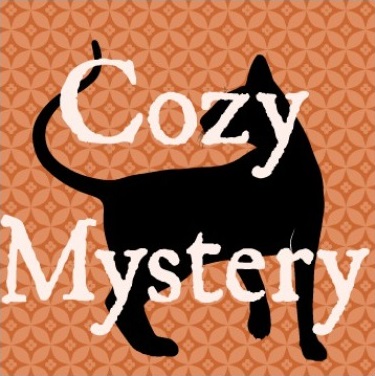

Alan Bradley: The Sweetness at the Bottom of the Pie![]()
Sigh. There is a lot to like in this book: the writing, the setting and the atmosphere, the underlying historic research (including appropriate pop culture references as much as a sensitive treatment of post-war PTSD), the opening nod to Jane Eyre, the bickering sisters, the fact that Flavia has given her bike a name and treats it as if it were a horse, and, well, the mystery as such. Unfortunately, the one character I'm having a problem with is Flavia herself. Oh, I get it -- she's intelligent and beyond precocious, she loves books, and she spends a lot of time alone and she has decided to turn vice into virtue ("if nobody else loves me, I have to love myself" -- remarkable insight to be expressed by an 11-year-old in pretty much these terms).
But that's exactly where my issues begin ... despite the odd age-appropriate behavior towards others, by and large both her mental processes and many of her emotional responses come across as way too adult. I'll even grant her love of chemistry -- Graham Young was obsessed with chemistry from an early age, too, and knew enough about poisons to murder his stepmother, after almost having succeeded in killing his sister, at the tender age of 15 -- and nearly get away with it, too. But leaving aside that going from age 11 to age 15 is still a virtual quantum leap in the development of a child: (1) knowledge of chemistry doesn't equal medical knowledge, and Flavia seems to dispose of an unreasonable amount of highly specific medical knowledge along with her knowledge of chemistry, including certain rare medical conditions (and don't get me started on how she could (not) have read about all of that in Gray's Anatomy); (2) book knowledge doesn't equal experience, and more often than not Flavia's analysis, actions and responses are not explicable by book knowledge, but only by the insight and reflections generated by a life experience far above and beyond even the most precocious 11-year-old child (this is particularly true in the final scene -- actually that whole scene is ridiculously implausible on pretty much every single level, but Flavia's age-inappropriate responses had started to bother me right at the beginning, with her discovery of the dying man); and (3) similarly (and on a related point), the grown ups' treatment of Flavia is way too "eye level" to be believable. Kudos to her dad for taking her seriously and trusting her with the full, tragic back story of the events, but for anybody else, let alone a policeman, to take an 11-year-old girl entirely seriously and communicate with her essentially like they would with an adult is just simply not realistic.
Maybe I've simply outgrown "child investigator" books -- I used to love the Three Investigators series and Enid Blyton's Famous Five, and Arthur Conan Doyle's "Baker Street Irregulars" make me smile to this very day. But even the "Irregulars", for however streetsmart they are, don't display any age-inappropriate behavior or reasoning; ACD knew as well as Enid Blyton and the Three Investigators authors that adults tend not to take children seriously, and even more importantly, they all understood that even fictional children get to outfox the police only if the policemen in question are just plain too dumb to solve the case on their own. But Inspector Hewitt doesn't strike me like that at all.
So, sorry for spoiling everybody else's party; I know I'm the odd one out here. Don't mind me -- just go on enjoying Flavia's adventures. I simply won't be along for the ride.


Angela Carter: Nights at the Circus![]()
You know that scene in Amadeus where the Austrian emperor comments on Mozart's music that it contains "too many notes"? That's how I began to feel after a while about the individual episodes, destinies, and narrative detours making up the sum total of this book -- they simply started to run into each other. Adjoa Andoh, who reads the audio version, said in an Audible interview about Nights at the Circus that Angela Carter is "generous" with her use of words (and towards her characters) ... which I don't necessarily mind; in fact, I've been known to downright revel in exuberant prose, but I confess that Carter has tested even my limits here.
Based on a simple premise -- journalist interviews "human swan" trapeze artist in the attempt to show her up as a fraud, instead falls in love with her, and ends up joining her circus as a clown so as to follow her to Russia --, this is an exploration of the world of Victorian carneys, circuses, and freak shows, of the divisions of class and culture(s), and of the exploitation of women and of the disabled (especially those perceived as freaks). If, going in, you have any misconceptions about the nature of Nights at the Circus based on its title and setting, or based on the fact that it is frequently described as "magic realism", at least in the audio version Adjoa Andoh's earthy reading will disabuse you of any such notions literally from the first word on: there is no question that Fevvers, the book's protagonist, is cockney to the bone; and more generally speaking, between them Carter and Andoh leave no doubt about the fact there is (or was) nothing remotely glorious or magical about the behind-the-scenes world of Victorian carneys -- nor about the previous lives of most carney artists, or the destiny awaiting them once they were too old to be able to perform. While pulling off enough of the veil for the reader / spectator to understand that much of what (s)he sees is an illusion, the lines are occasionally blurred, and not all is revealed to the naked eye -- and even where Carter applies her exuberance to the plainly ridiculous, never once does she lose an ounce of respect for her characters (nor, for that matter, does Andoh's narration). Yet, this is one book where I'll likely want to revisit the printed version at some point in the future, because Andoh's performance, splendid as it is, is so dominant that I couldn't help wondering sometimes if the characters -- first and foremost Fevvers herself, but others as well -- would have sounded exactly the same in my head without anybody else's intervening interpretation.
In the meantime, though, give me Fellini's La Strada (and The Clowns) any day of the week ...


Daphne du Maurier: Frenchman's Creek![]()
If it weren't for du Maurier's indisputable gifts as a writer, and for the splendid things that are Rebecca and The Birds, my most recent reads of hers, between them, would have seriously made me doubt if she is for me at all, had these been my only introduction to her writing. While Jamaica Inn at least excels in terms of creating a truly oppressive and spooky atmosphere (and since I read it primarily for that, I was willing to give du Maurier considerable slack in terms of the plotline ... until I got to the beyond-eyeroll-worthy ending, that is), Frenchman's Creek lost me even before it really had started to get going and never recaptured my attention. That being said, it's the sort of totally implausible, romantic pirate adventure that would have riveted me in my early teens. Problem is, I'm not a teenager anymore, I expect people (both fictional and in real life) to act with at least a minimal amount of rationality -- and book characters to be at least substantially self-consistent (and consistent with their station in life) --, and I no longer believe in insta-love. So I'm just going to say thank you to Ms. du Maurier for once more taking me to 19th century Cornwall, which comes across as decidedly more lovely here than it does in Jamaica Inn (but then it would, this being a romance at heart), and thank you to John Nettles for giving his utmost to make this a captivating audiobook experience. But for once, I was glad to have contented myself with an abbreviated version ... and I don't think anything will tempt me to revisit this novel anytime soon (even though here, too, I actually own a print edition as well).

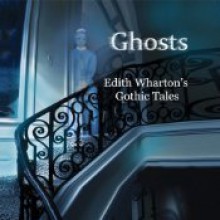
Edith Wharton: Ghosts: Edith Wharton's Gothic Tales![]()
As the title says, a selection of audio narrations taken from Edith Wharton's collection of ghost stories: big on atmosphere and on Wharton's lovely, insightful, empathetic writing; negligible to nonexistent on blood and gore. This is how I like my gothic fiction! As in her novels, Wharton relies entirely on subtle means of psychology; on our innate fear of the unknown, on our need to empathize, on uncertainties -- about the right way, about another person, or the accuracy of ancient writings and legends, or how far to trust our own senses; on changes of light, visions barred, sounds more devined than actually heard, and ethereal smells wafting by but impossible to source. There is room for delicate humor here as well as for compassion; my favorite stories being, probably, Mr. Jones and Kerfol
(warning, however: the dog dies. Or rather, the dogs die -- several of them in short succession. But they get their revenge in the end)
... though, really, it's difficult for me to pick any clear favorites at all.


Terry Pratchett: The Colour of Magic![]()
"The discworld offers sights far more impressive than those found in universes built by Creators with less imagination but more mechanical aptitude."
Aaah ... Sir Terry. What would Halloween Bingo possibly be without you? Especially this year, what with Wyrd Sisters being the official bingo group read --and having inspired Booklikes's very own Discworld group, which very properly decided to read all the books in the order of publication. So, another Halloween Bingo with no less than two Pratchett books -- yey!
Before I started to explore the Discworld universe, people told me to just dive in anywhere, it didn't matter with which book I started; and that's just what I did. But after going a-roving here and there, it's been pure joy to come back to the very beginning and see where it all started. The Colour of Magic is a hilarious romp through 1980s fantasy (and to a lesser extent, science fiction) conventions; Big Bang turtle theory, imagine-dragons, magic sword, hero lore, staffless wizard (Rincewind), naive tourist and all. The tourist (Twoflower: an inn-sewer-ants agent by trade with a reckless disregard for his own and Rincewind's personal safety) has even brought a precursor of the glorious Hex, as it were; an iconograph ("device for taking pictures quickly") with a demon inside who will sketch a perfect likeness of you in anywhere from 30 seconds upwards. And then, of course, there is The Luggage ... can there possibly be a more apt application of the "Relics and Curiosities" bingo square? All the essentials of what makes Discworld -- well -- Discworld are in place here already, even if Pratchett may have further fine-tuned his style in the subsequent books (many of which, as a result, are even funnier). I was glued to my speakers from the first second of Nigel Planer's hilarious, spot-on narration, and I also have to say that I liked The Colour of Magic quite a bit better than Equal Rights, the first Witches book (and overall, Discworld #3).
"This tourist is a thing that is out of place. After acceding to his master's wishes Nine Turning Mirrors would, I am quite sure, make his own arrangements with a view to ensuring that one wanderer would not be allowed to return home bringing, perhaps, the disease of dissatifaction. The Empire likes people to stay where it puts them."





 Log in with Facebook
Log in with Facebook 
